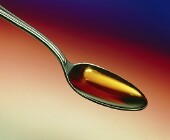 |
 |
 |

Preemies Exposed to Toxins in Liquid Meds
Called excipients, these agents include chemicals that can cause nerve damage, study says|
|
HealthDay
By Robert Preidt
Friday, January 23, 2009
 FRIDAY, Jan. 23 (HealthDay News) -- Potentially harmful agents called excipients are contained in liquid medicines commonly given to premature infants, according to a U.K. study.
FRIDAY, Jan. 23 (HealthDay News) -- Potentially harmful agents called excipients are contained in liquid medicines commonly given to premature infants, according to a U.K. study.
Excipients are used to ease the administration, absorption or preservation of the active substances or to improve the taste and appearance of the liquid medicines, according to background information in the study.
The British researchers assessed the type and content of liquid medicines given to 38 premature babies in a neonatal intensive care unit. The babies were treated for between 2.5 weeks and nine weeks and given a range of treatments, including iron, vitamin drops, furosemide and fexamethasone.
During their treatment, the infants were regularly exposed to 20 different excipients, including ethanol (found in iron and furosemide) and propylene glycol (found in dexamethasone). These chemicals can cause nerve damage.
The infants' exposure to ethanol ranged from 0.2 ml to 1.8 ml a week, equivalent to one to seven units of alcohol, while exposure to sorbitol (dexamethasone and iron) ranged from 0.1 to 3.5 g/week. The recommended maximum intake of sorbitol for adults is 20 g/day. When calculated by weight, this level was exceeded in 18 babies for at least one week. The study also found that all babies given dexamethasone exceeded the recommended levels of propylene glycol, which is about two-thirds the strength of ethanol.
The seven infants with severe lung disease were exposed to higher levels of excipients than the other premature babies.
The findings were published in the Fetal & Neonatal Editions of Archives of Disease in Childhood.
It's difficult for makers of children's medicines to tailor their products for each age group, and the use of some excipients is necessary, the study authors noted. However, they concluded: "We feel it is important that the [medicines regulators] not only ensure that all manufacturers provide detailed labeling of the excipient content of their products but all lead action to determine whether existing practice constitutes a risk, and if so, how this might be dealt with."
HealthDay
Copyright (c) 2009 ScoutNews, LLC. All rights reserved.
Related News:
More News on this Date
Related MedlinePlus Pages:
| Home | Health Topics | Drugs & Supplements | Encyclopedia | Dictionary | News | Directories | Other Resources | |
| Disclaimers | Copyright | Privacy | Accessibility | Quality Guidelines U.S. National Library of Medicine, 8600 Rockville Pike, Bethesda, MD 20894 National Institutes of Health | Department of Health & Human Services |
Date last updated: 26 January 2009 |




